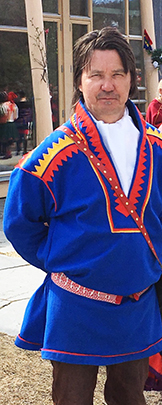John Nystad is the deputy mayor of Kárášjohka gielda/Karasjok municipality and a local Sámi politician. As an invited speaker in the closing seminar of the Recognising Indigenous Rights and Local Perspectives project at the Arctic Centre, Rovaniemi, 14 February 2018, he gave the following speech and insights based on his experiences in the current issues in Kárášjohka/Karasjok.
As a deputy mayor of Kárášjohka/Karasjok municipality and a local Sámi politician in the north of Norway I would like to reflect upon the various struggles I have been involved with over the past few years, and taken a lead in, from 2013 to 2018. There have been surprisingly many and important ones! As an elected representative in a Sámi municipality it is my duty to take a lead in Sámi politics, be it locally, nationally or internationally. Nationally because decisions nationally may often provide a basis for indigenous people’s politics internationally. I would like to summarise the challenges that have been made, and still are being, fought by the Sámi municipality of Kárášjohka/Karasjok.
1. Summer and autumn 2013: Stopping the mining and dumping of slag and waste into the sea at Repparfjord
I led the initial political action, the Finnmark Action against Poisoning from Mining. At the present time, the start of mining operations at Repparfjord and deposition of poisonous slag and waste in the fjord has been halted. The dumping of slag and waste would negatively affect life in and around the fjord as well as having wider social, economic and cultural consequences for the world’s finest cod fisheries in the Barents Sea. Should sea deposition of mineral waste be granted, close to Hammerfest, the world’s most northerly town, Norway would place itself together with the likes of Papua New Guinea and Turkey. Russia, the USA and Brazil and most others do not allow dumping of mining waste in the sea. Activists from Hammerfest and the municipality of Kvalsund, where Repparfjord is located, requested help from Sámi organisations and politicians in the fight to stop deposition in the sea. This has brought an indigenous peoples’ perspective into the debate.
2. Autumn 2015 Enlargement plans for Upper Anarjohka National Park in Kárášjohka/Karasjok municipality
After 5 years of struggle from 2010 the decision to reject expansion plans for Upper Anarjohka National Park was made just before Christmas 2015. Opposition groups managed to resist the EU’s Habitat Directive that requires Norway to increase the area of its national parks to 14% by 2015. The enlargement proposal would have increased the park near up to 20 % of Kárášjohka/Karasjok’s area. Large areas used for reindeer husbandry, hunting and fishing would have suffered from extreme regulation. Anarjohka National Park already has Norway’s strictest regulations.
3. 2017 The struggle against the proposal by the joint states of Norway and Finland to grant virtually identical fishing rights to non-residential Finnish cottage owners in Utsjoki municipality.
The proposal to allow non-resident cottage owners in Finland the same fishing rights that local residents have enjoyed for over 100 years will have a negative effect on Sámi cultural life in the river valley. Owners of existing small businesses and local people will lose their livelihoods if non-residents on the Finnish side are granted fishing quotas, giving them the right to row and take their guests on fishing trips. The consequences will be enormous for Sámi culture: the depopulation of Utsjoki municipality, the loss of the Sámi way of life and the endangering of the existence of Sámi language in Finland.
Continues on the following blog 2/2
John Nystad
Deputy mayor of Kárášjohka gielda/Karasjok municipality
Finnmark, Norway
